“Try being homeless without having something to care for, and then you tell me. He helps me and I help him. I take better care of him than I do myself.”
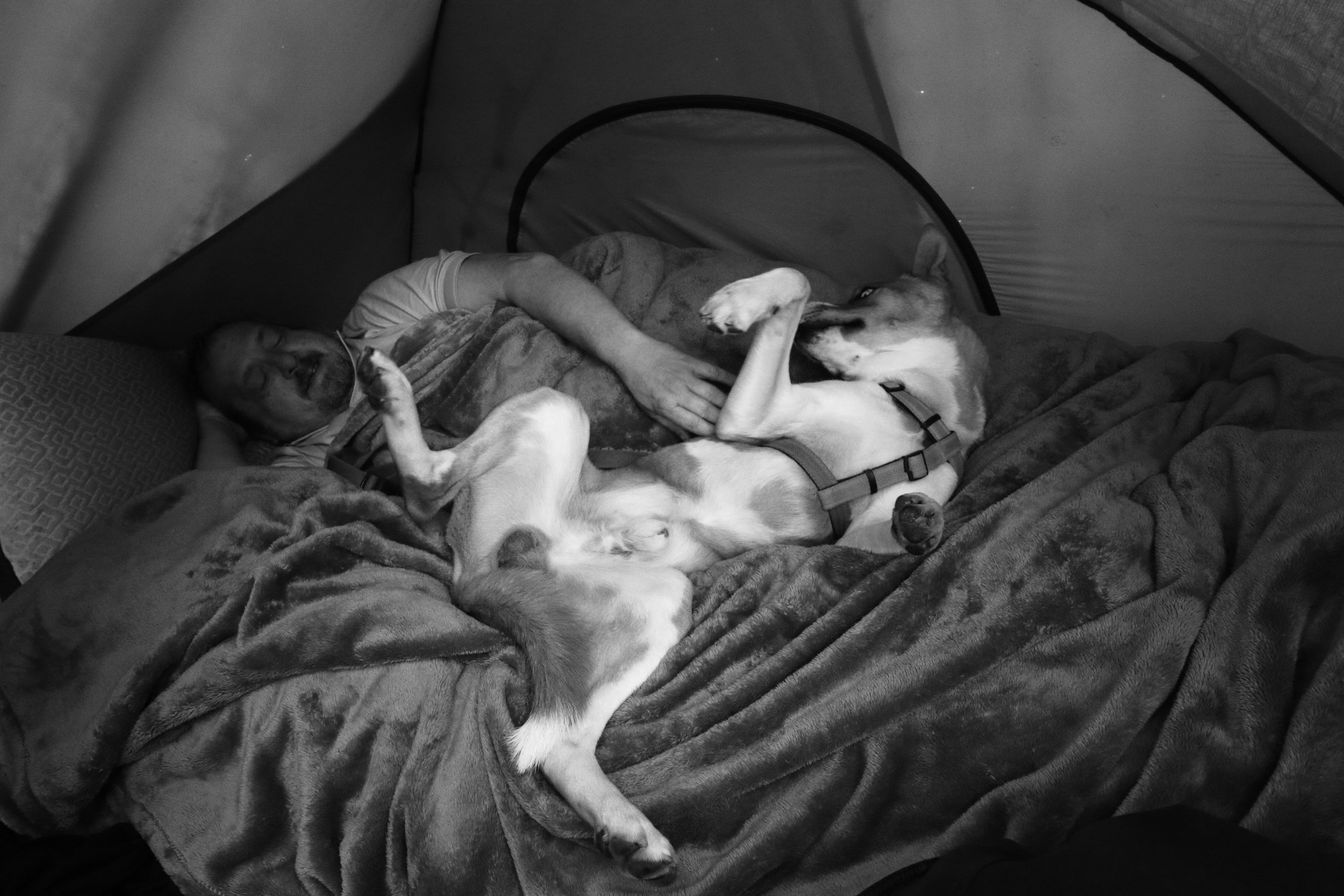
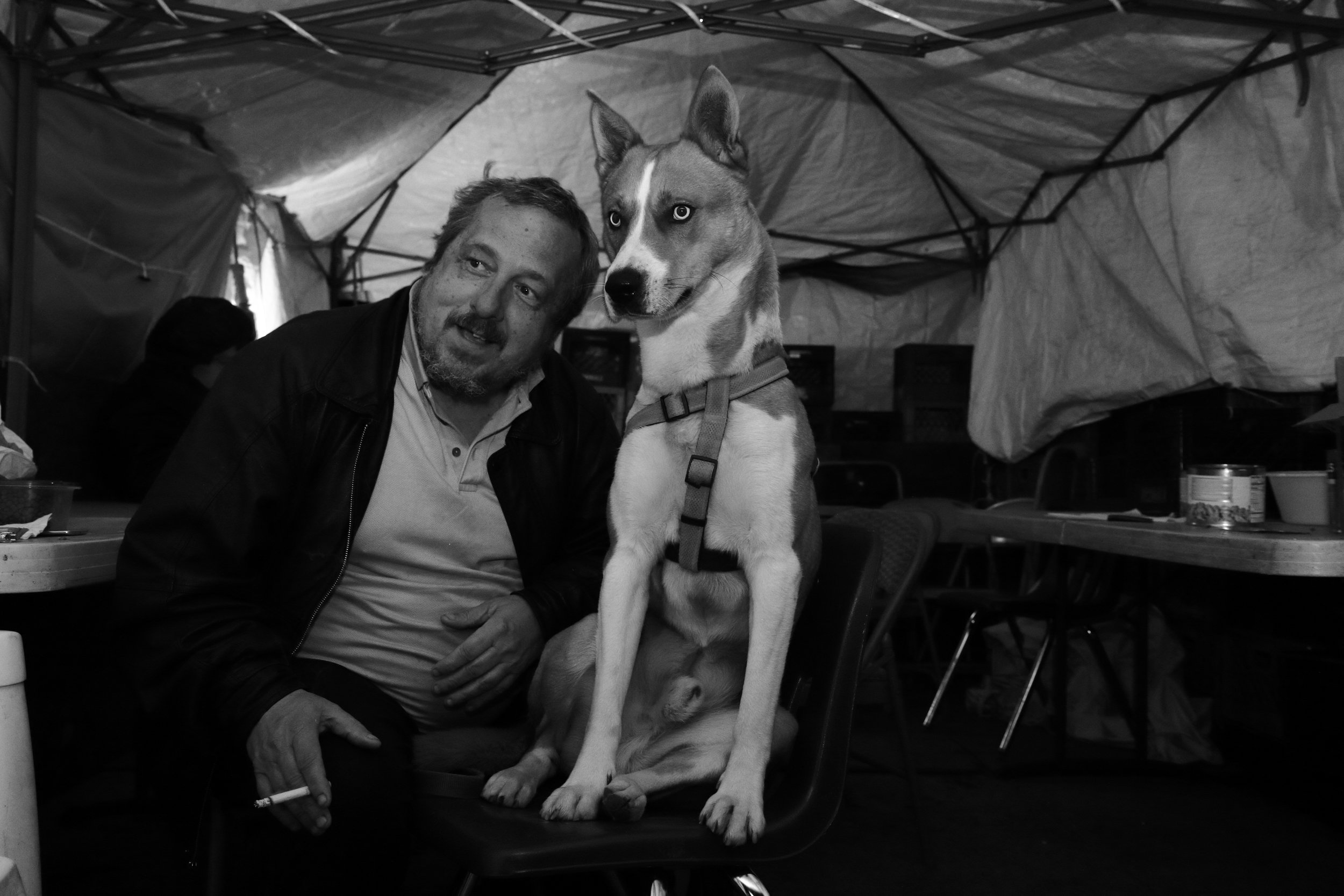
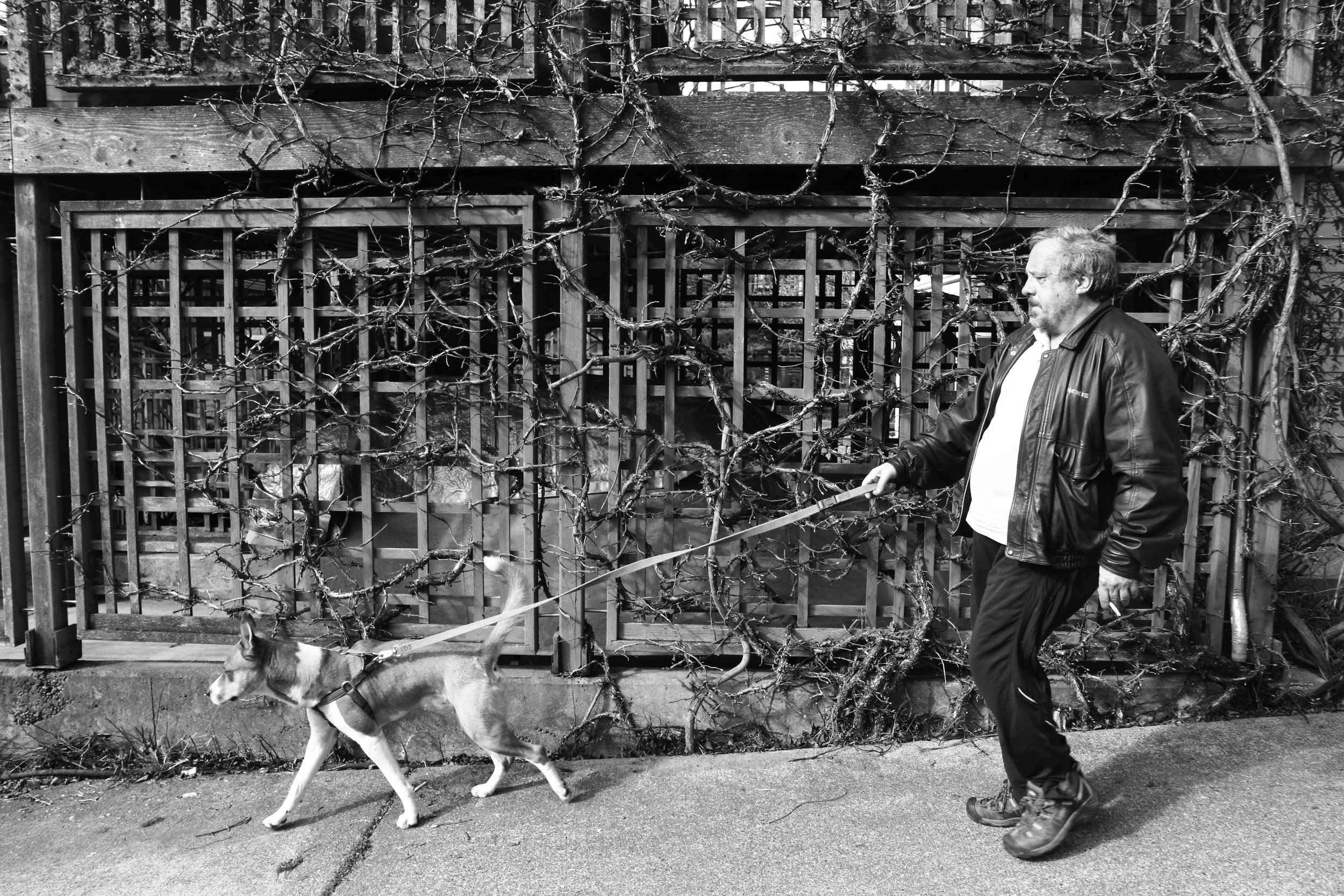
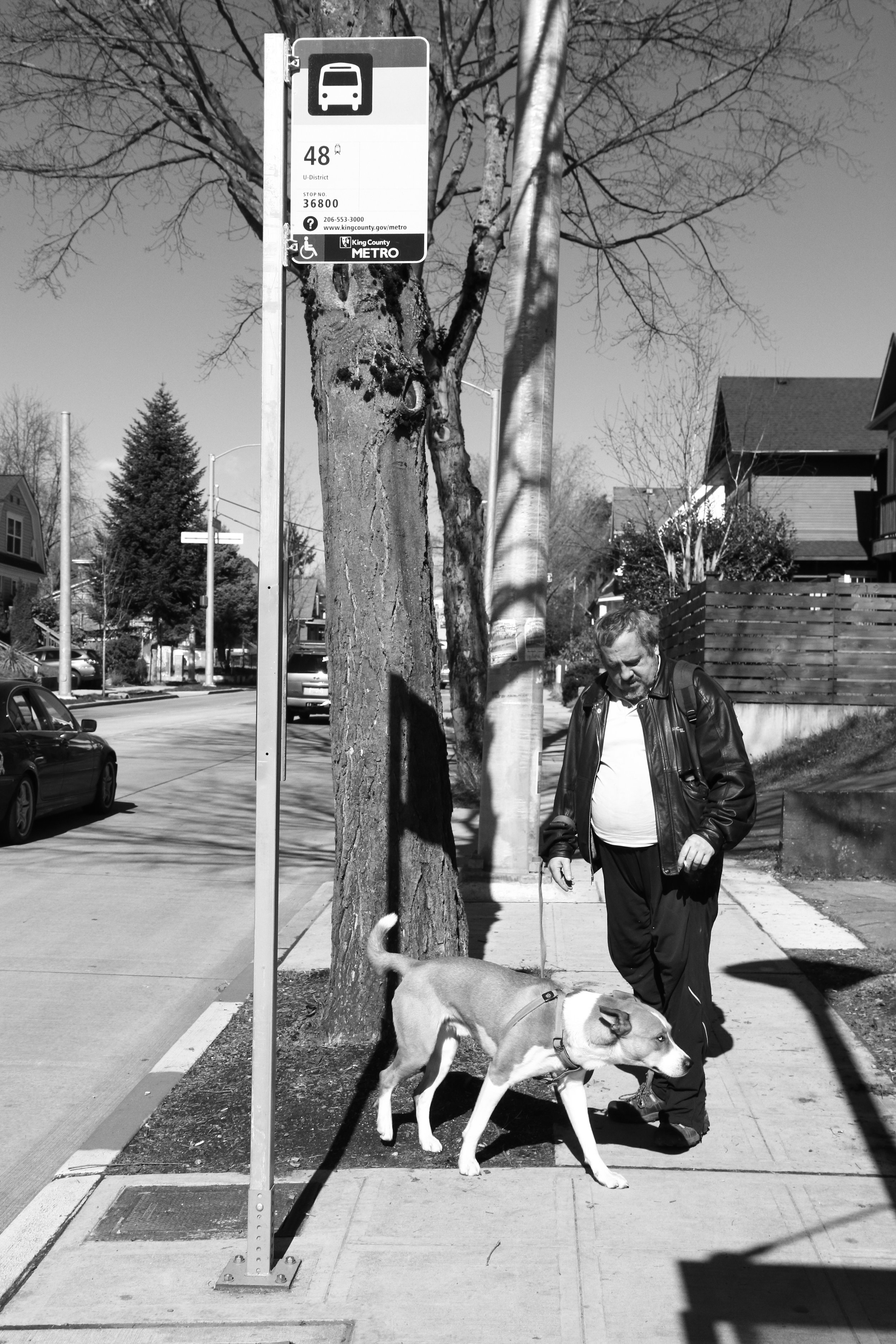

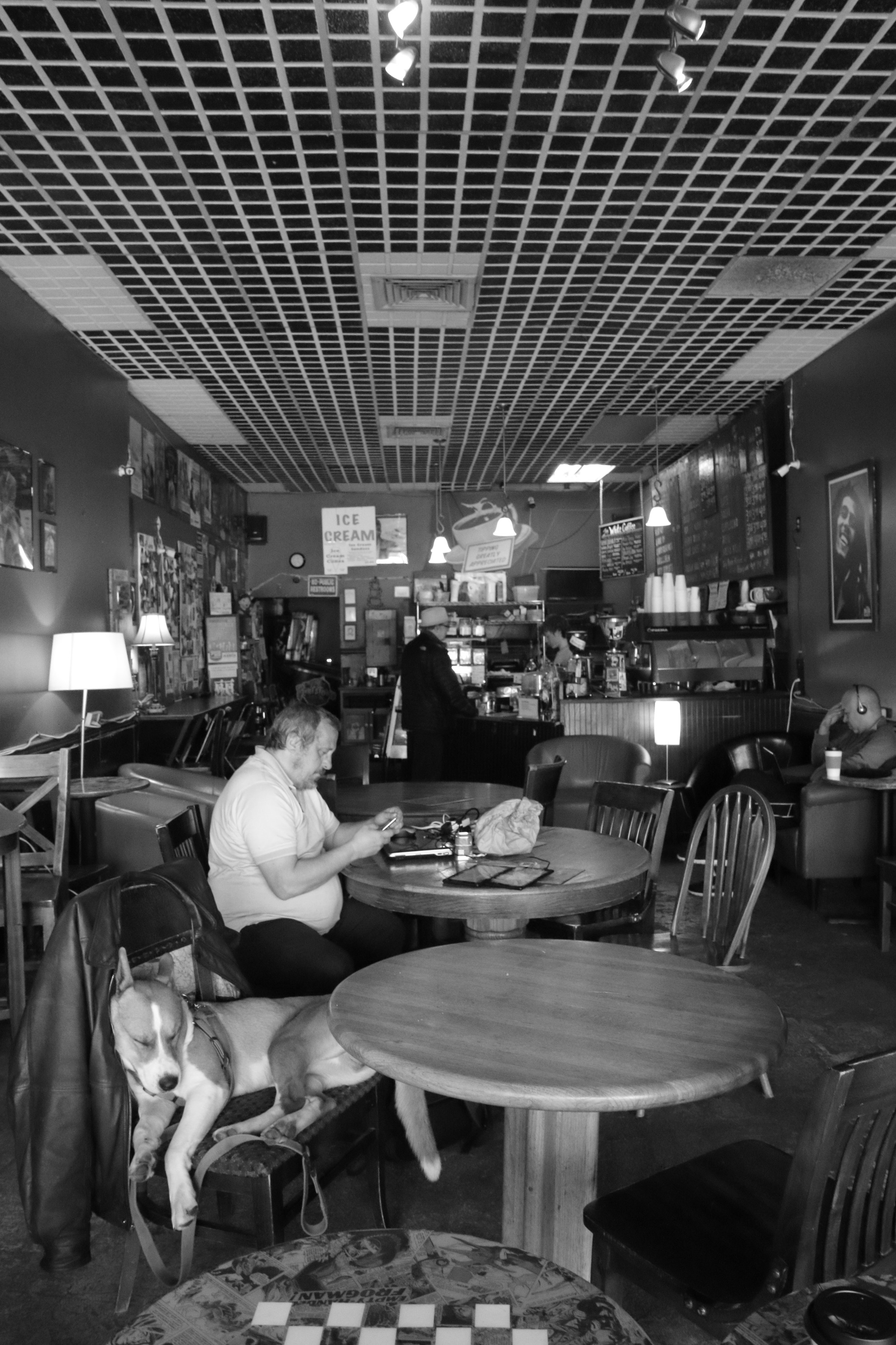
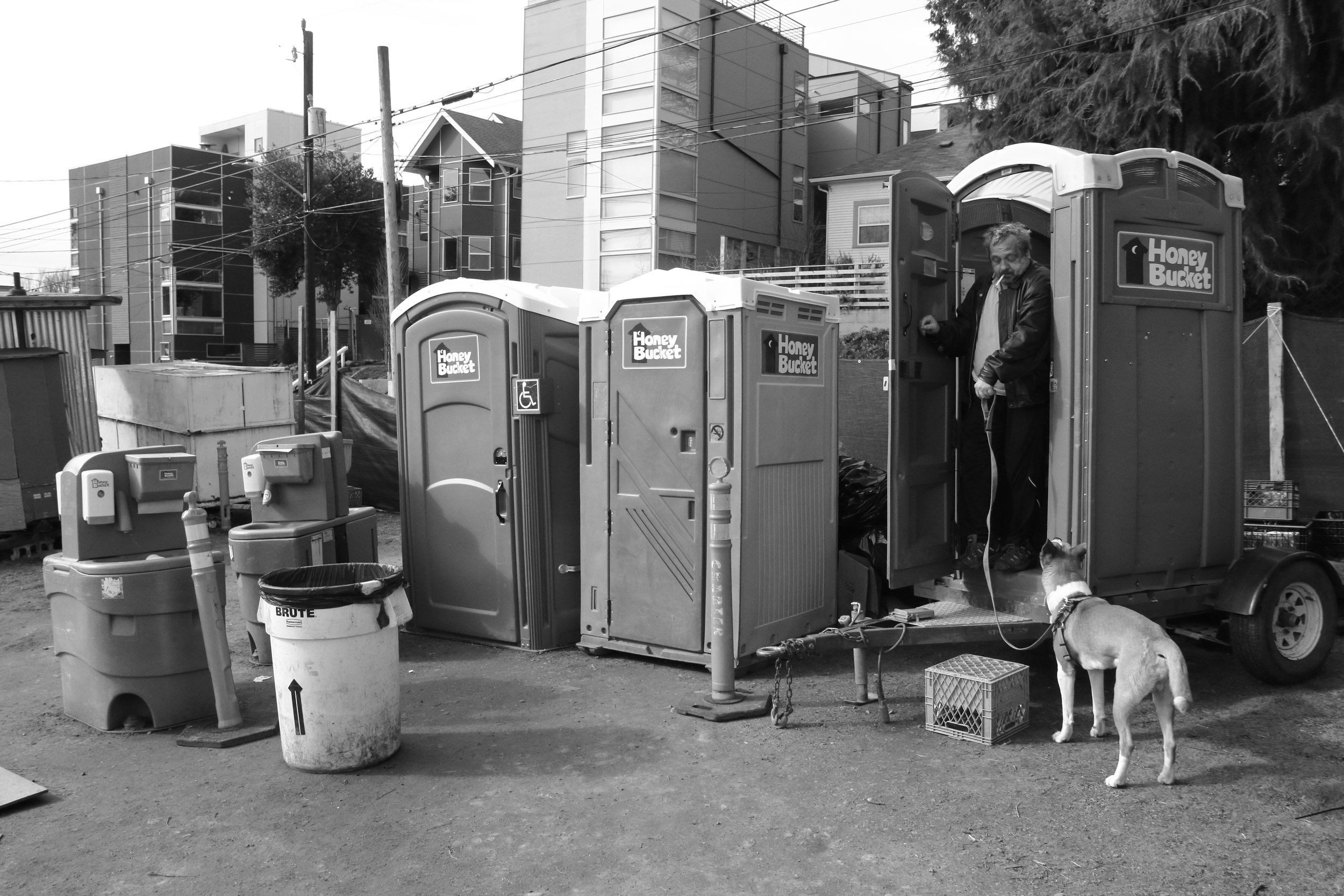
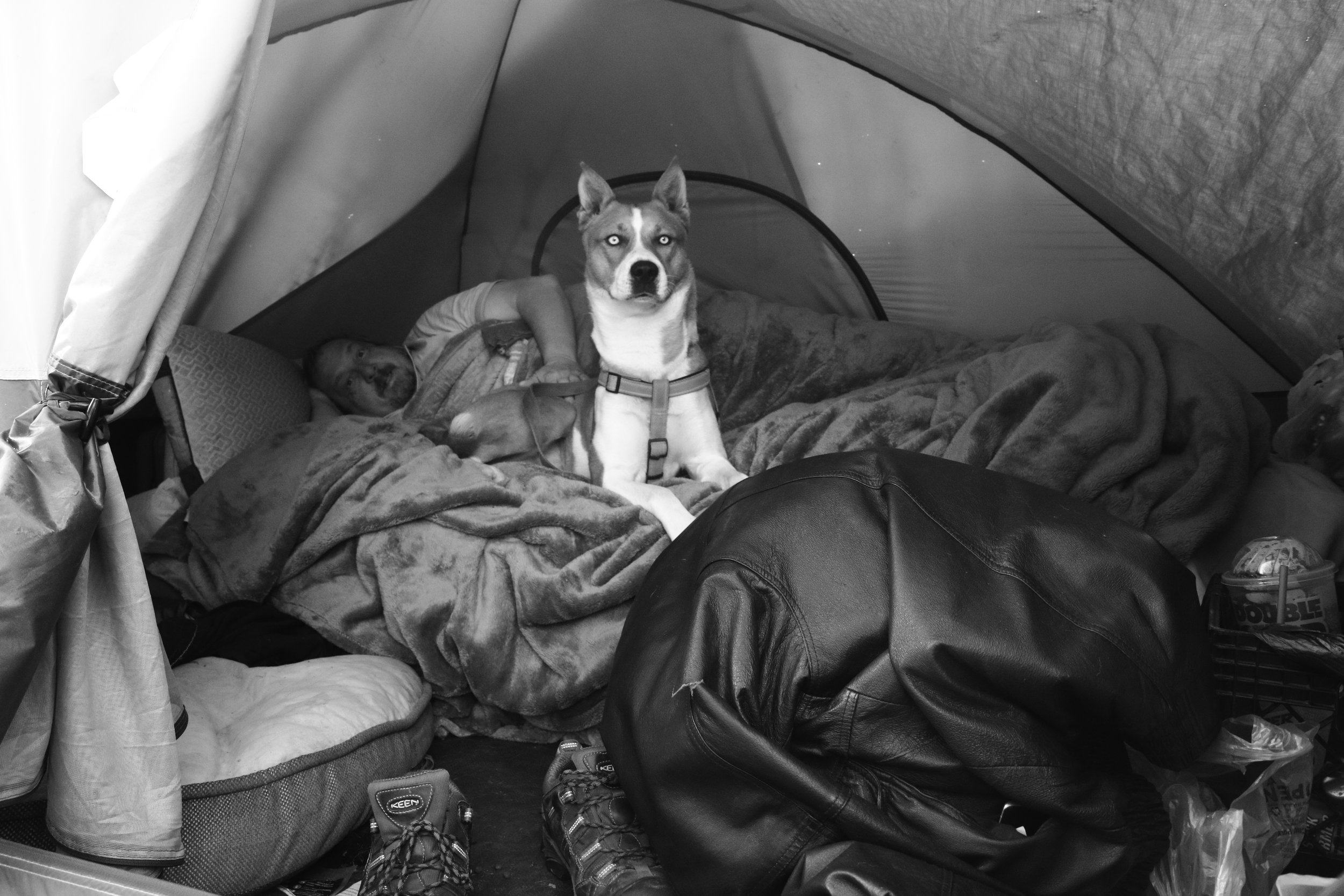
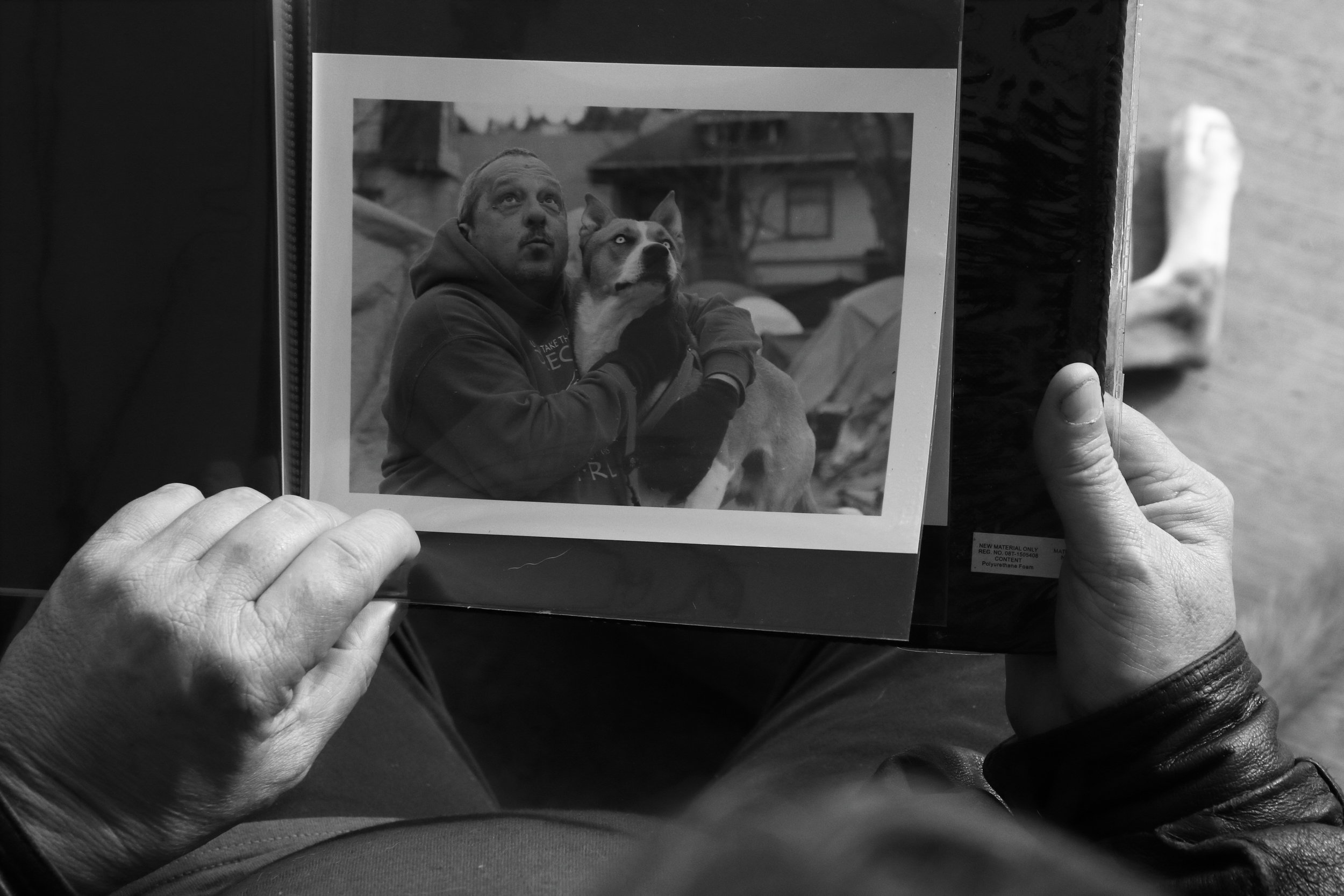
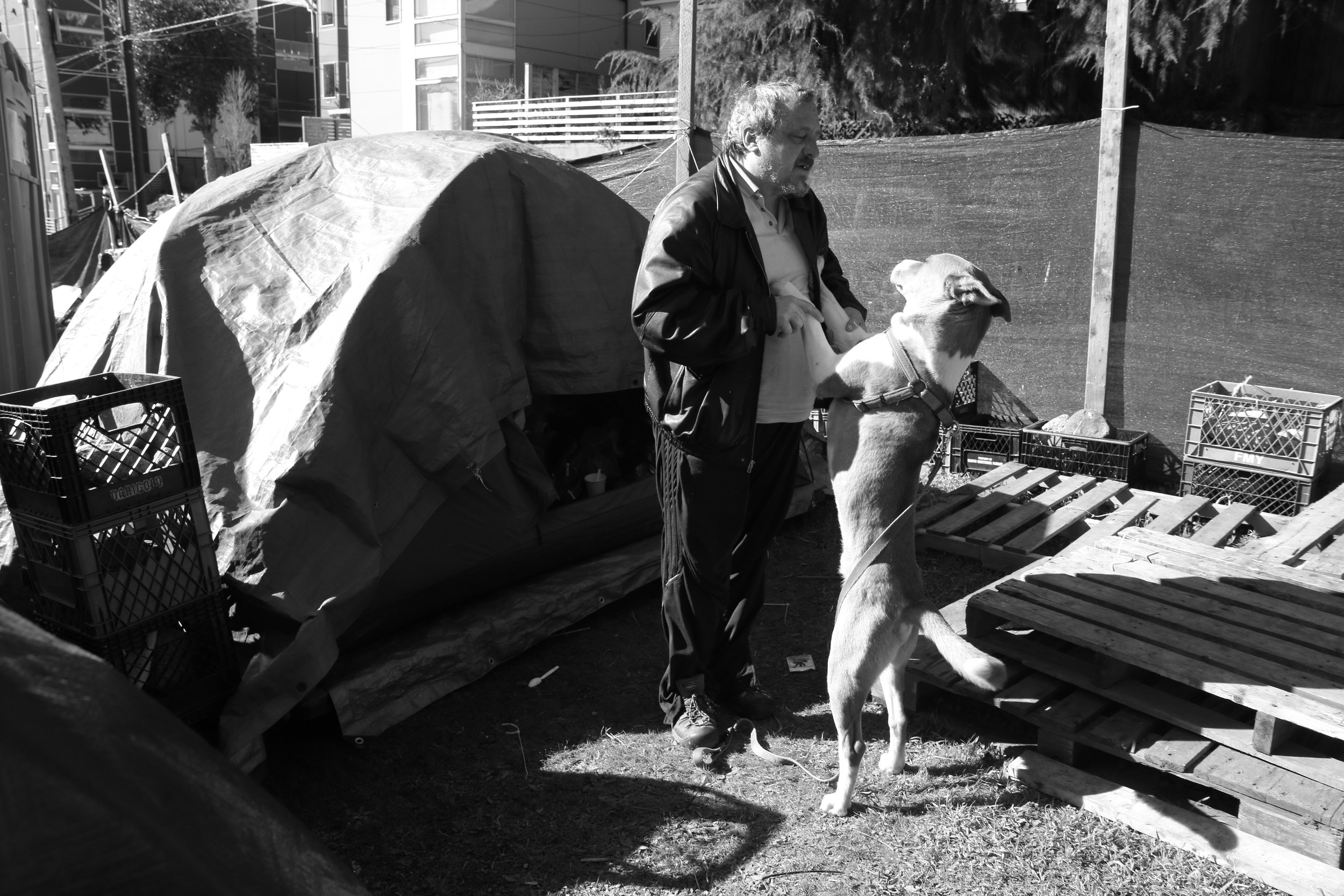
Although dogs have always been part of Sonny’s life, Houdini is the first dog that Sonny has been completely responsible for. It’s changed his life in a way that makes him wonder how different his story would have been if he’d had this kind of relationship with an animal earlier in his life. “Oh he’s my son. I mean, he’s my kid. And see I’ve never had a dog to where I’ve had to take care of it. I’ve had dogs all my life, but somebody else has always taken care of them, I’ve never had to take care of them myself and worry about a vet or worry about getting their shots and stuff like that. And he’s the first one that I’ve actually had to worry about getting his shots, making sure he’s not doing stuff he’s not supposed to, so on and so forth. Personally, myself I think I should have had [a dog] that I had to take care of a long time ago, maybe I wouldn’t have ended up where I’m at now,” Sonny says.
Houdini entered Sonny’s life just over a year ago, in February of 2017. Sonny was living in Tent City 5 at the time when a couple moved into camp with two dogs, Houdini’s parents. The female was already pregnant and her puppies were born about a week into their stay at TC5. Sonny had already been helping out with a friend’s dog and had been thinking about getting his own. “I’d always wanted a dog,” he explains, “I love dogs and I had been talking about getting a dog even though I was homeless.” After talking to the owner about getting one of the puppies, one day it all fell into place – “I think it was February 1st. I was sitting in Starbucks over on Dravus and 15th and I’m sitting there playing with my computers and everything like I always do and in comes Jennifer with her daughter and they have [Houdini] in their arms. And she brings him over and she sits him in my lap and she says, ‘Here he’s yours, you can have him.’ And so from that time on he changed my life.”
After a little over a year together, Sonny sees the changes in his life through having Houdini. “It’s helped as far as, I’m taking better care of myself, you know, because I don’t want to be without him and I don’t want him to be without me. And by that I mean I’m doing what I’m supposed to to keep myself a little healthy, not a lot healthy. But I want to be around for him as long as I can be.” For Sonny, this means dealing with systems he would have avoided before in order to ensure he can provide for Houdini. “When I first got him, I made a decision that I was gonna do what I needed to do to have money coming in every month, even though it’s only a little bit of money, but whatever money I had coming in a month so that if I had to I could take care of him. And so that’s the reason I applied for disability [for my back injury] again, that I applied for the [Aged, Blind, and Disabled]. I jumped through the hoops which I hate jumping through, but I jumped through the hoops because of him. And that’s where he has really changed my life.” Sonny now has a regular doctor, psychiatrist, and is signed up for Medicaid.
“I’m taking better care of myself, you know, because I don’t want to be without him and I don’t want him to be without me. ”
Others are noticing the changes too. After only a few months of having Houdini, Sonny’s doctor asked him “You’re doing better, what’s going on?”. “And I told her,” Sonny says. Seeing that shift in Sonny was enough to have his doctor offer to write a letter certifying Houdini as an emotional support animal for his help they saw he was providing with Sonny’s anxiety and depression. Sonny says he hasn’t really needed to show the letter yet, but that he always takes it with him wherever he goes just in case. He also notes that there is a difference between the role Houdini plays in his life and a service animal – “He likes to play with any anybody and everybody. So there’s a difference between him and most service animals – most service animals won’t play. And a lot of dogs don’t like it, a lot of dogs are service animals, so you have to be careful.”
Even Sonny’s family, with whom relationships are tense, is noticing the difference Houdini has made in him. “Even my brother – who despises the fact that I live in Tent City – even he has told me that he has seen and heard a change in me since I’ve have him, that I’ve grown up a little, or grown up a lot, and I’m actually taking responsibility for something.” Still, he says, “my whole family thinks that I’m crazy for having a dog, you know, because I am where I’m at. But what they don’t realize is that it gives a person a sense of being, having a dog to take care of. And I honestly find that homeless people take better care of their dogs than most people.” Having this kind of responsibility is a big shift for Sonny. “I have to get up and take him for his walks, take him for his pee sessions, his sniff sessions. He gives me a reason to actually wake up in the morning. Before it was, yeah I’d wake up because I had to do securities or I had some time on the desk, so on and so forth. But now I have to get up to take care of him. And I never had to do that before.”
Sonny has been in and out homelessness for most of his life. His first experience with it was at the age of 18 after a failed marriage. He and his ex-wife had married at 17 after a one-time sexual encounter resulted in an accidental pregnancy. “She knew I was gay, I knew I was gay, but we tried to make it work. After the kids were born, about six months after they were born, we both knew it wasn’t going to work. And we had already made a promise to ourselves that if either one of us felt it wasn’t going to work out, we’d leave and let the other have their lives.” He left for CA and ended up on the streets. Eventually he moved to Portland and found work, meeting a new partner who he moved in with. He had his partner, Dale, were happy together until Dale tragically lost his life in a car accident when Sonny was 29. His grief and a suicide attempt landed him back in homelessness, couch surfing around the country before eventually landing in Seattle in 2000 and finding Tent City 3. After a brief stay there, Sonny got offered work as a live-in caretaker for an elderly couple. He did this work from 2000-2015 with a number of families around the country, including his own. After everyone he was caretaking passed away, he ended up back in Seattle. “I just decided to come back up to Seattle. I knew Tent Cities were here, I knew how they treat the homeless, I knew what to expect, and everything like that.”
“He gives me a reason to actually wake up in the morning. ”
As for being homeless with a dog in his life this time around, Sonny feels that overall it’s been pretty easy for him. “Seattle has one of the best attitudes towards dogs. I mean, this dog can go anywhere with me and nine times out of ten people won’t say anything. And they have free healthcare every second and fourth Saturday of the month through the Doney Clinic.” Through Doney and other veterinary clinics in the area, Sonny has made sure that Houdini gets check-ups twice a year and is up to date on his vaccinations. Houdini gets his bathes along with Sonny at the Urban Rest Stop and at the YMCA. For food, most of what Sonny feeds Houdini comes as donations to Tent City. Houdini comes along to Sonny’s doctor’s visits and Sonny has learned which places he will either frequent or not return to, based on how they’ve treated the two of them – “any place that has a problem with him I don’t deal with,” he says.
Even with all of their basic needs met, if anything bigger ever came up Sonny knows he’d do whatever it took to get Houdini what he needed. “Yes, we get dog food donated here, we get stuff coming in and that’s all good, but you know, if there was something that he needed and I had the money and I had to have something for me or for him, if it was a choice, it would always be him. To me he will be first in my life. Even if I was to have a relationship or anything like that, if they couldn’t accept him, too bad.” As an example, Sonny tells a story of how, when Houdini was young and always chewing through his harnesses, he only had enough money to either get his own medication or get Houdini a new harness. “I had to get medication for myself, and at that time I didn’t have insurance and so I was trying to deal with it myself. And I had to either get my psych medicines or get him a harness. And yes, the psych medicines help, I’m not saying they don’t, but when it came down to the choice between that or his harness, I got his harness instead of my meds.”
There is one thing Sonny refuses to do with Houdini, though – panhandle. “I’ll be honest with you, I could probably sit in front of a store with him and a sign and I could probably make a couple of hundred dollars a day just from people coming by and seeing him, you know, but I don’t do that. And it’s not that I think people who do it are wrong – it’s the way they survive. But I don’t need to survive that way. I mean yes, it would be nice to have a couple of hundred dollars a week so to be able to do something, but I’m not gonna exploit him to do that. And to me that’s what you do when you have your animal.”
“If it was a choice, it would always be him. To me he will be first in my life.”
Thinking to the future, Sonny says if he ever came into enough money he would want to establish a foundation that provided foster care for people experiencing homelessness with their animals. “Say you went to jail or you went to the hospital or something like that, then you would have, you could always bring them back you know, you don’t have to sell them or you don’t have to let them get taken from the pound. Call and we’ll come and pick it up. And then that way you have an option of having somebody take care of your dog while you need to do what you need to do.” This idea is personal for Sonny, having had Dale’s dog taken from him soon after Dale’s death when he had to go to jail for a week for an outstanding warrant. “And so I lost him to the pound. And I was only in jail for a week. But by the time I got out of jail it was gonna cost me $600 to get him out of the pound, and that was $600 I didn’t have. And so I had to sign over the rights to give him to somebody else. So that was really hard for me. And so I always made a promise to myself that if I ever had another dog I would always make sure that there was some backup plan, upon a backup plan, for somebody to take him.”
Although Sonny has made arrangements with his sister to take in Houdini if anything ever happened to him, he feels that living in a Tent City has also afforded him more community and help with his dog. “You know anybody in this camp, if I had an emergency and I couldn’t do anything I’m sure they would watch him until [I got back]. And that’s the one thing I like about the Tent Cities – you actually get a community of people who care. And don’t get me wrong not everybody cares about everybody here, but for the most part we take care of each other. And I have found in the indoor shelters that doesn’t happen.” One other resident in particular, Ali, has helped with Houdini immensely in terms of taking him out for long walks and playtime, things which Sonny has limited ability to do because of his back injury. Sonny thinks it helps with his behavior, too, “Honestly think because of where we live it’s helped a whole lot with the way he acts and the ways he’s grown up. Because he likes everybody, he’s never really been aggressive to anybody.”
And for anyone who says that you can’t be homeless and take care of an animal, Sonny says “Try being homeless without having something to care for, and then you tell me. He helps me and I help him. I take better care of him than I do myself.”
